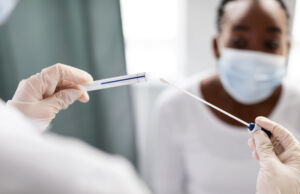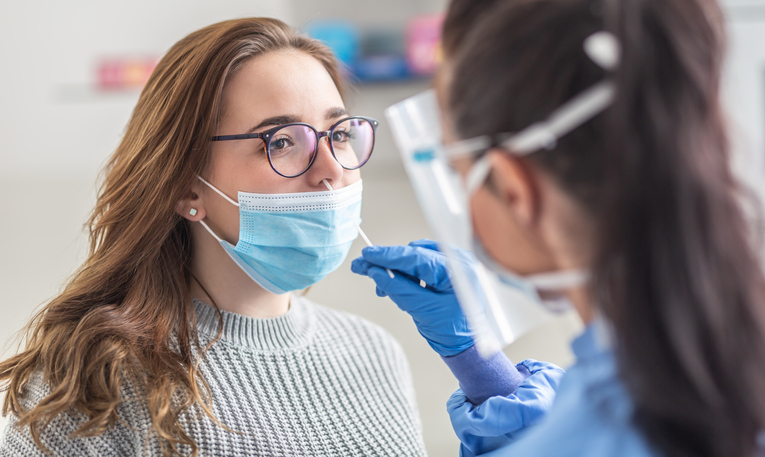COVID-19 has now overlapped with flu season. The truth is that if you’re pretty active with your social life, you’re probably going to catch at least once either Covid or flu. Testing is the most direct way to distinguish the two viruses – flu and COVID.
COVID-19 and the flu have many similarities in common. How do you know which one you’re dealing with?
Both COVID and the flu are respiratory infections that frequently spike during certain seasons. Once you catch either of these viruses, the symptoms last you about a week. Also, both can be exacerbated by some of the illnesses that are pre-existing.
Despite their similarities, it’s important to know that they are not at all the same. They are brought on by different diseases and affect your body in various ways.
The flu, often known as influenza, is a respiratory ailment that can either go away on its own or develop into something severer. Contrarily, COVID-19 is a coronavirus brought on by the SARS-CoV-2.
You can protect yourself from avoiding potential public exposure and getting the vaccine to prevent the virus from becoming a serious infection. Our clinic provides a combined free covid test in Los Angeles and flu testing, which can assist you in resolving the issue once and for all.
If you’re just trying to figure it out on your own, you can think about comparing your symptoms to what both diseases are often known for.

The following signs and symptoms are consistent with both COVID-19 and the flu, according to the CDC:
- Coughing
- Breathing difficulty
- Fatigue
- Throat discomfort
- Headaches and body aches
- Lost smell and taste temporarily
Typically, flu is more likely to cause digestive problems including diarrhea and vomiting. One of the typical signs of COVID-19 is an unexpected change in taste or smell while those who are congested from the flu may taste or smell differently.
December to February is the time for flu season, and during these months, it almost matches the timeframe presently known as the surge season for COVID. Because of the overlayed season, it is ideal getting tests for both the flu and COVID.
Allergies?
From December to February, allergies also fit in the timeframe, people who have allergies are typically quite aware of their seasonal patterns. However, allergy symptoms are sometimes mirroring the flu or COVID in an alarming way.
The reasons for causing allergies are not because of pathogens. Instead, allergens trigger your immune system to respond differently which affects the rest of your body like a ripple effect. Allergy symptoms include coughing, sneezing, itchy eyes, and a runny nose.
Allergies typically take after the common cold instead of the flu or COVID. Simple allergies are not likely to be mistaken for the flu or COVID unless you have asthma or have a hard time breathing.
Getting a test is the most reliable way of getting immediate answers to avoid the risk of mistreatment while our facility offers free PCR tests in Los Angeles. We advise taking more rest, hot soup, tea, and a warm bath if you have the symptoms.
What distinguishes COVID-19 from the Flu?
Flu and COVID are different from one another. At the end of the day, we advise getting a covid PCR test so that you can plan accordingly with your symptoms. Our clinic is offering walk-in covid testing in Los Angeles.
Despite the fact that no one enjoys feeling sick, the good news is that in people who are generally in good health or have their vaccine and booster prior, both of these diseases are controllable. If you’re already feeling under the weather, make sure to eat well, drink lots of water, and get plenty of rest. The most important thing is to get a Covid PCR test regularly to protect yourself and your loved ones.

What is the best timing to get a covid test?
- Test right away if you are experiencing symptoms.
- Wait at least 5 full days after your exposure to COVID before testing. You might get the wrong result if you test too early.
- If you live in an area with a medium or high COVID-19 Community Level, consider testing before reaching someone at higher risk for getting severe symptoms from COVID.
- Visit Isolation and Precautions for People with COVID-19 for advice on how to use testing to establish which mitigations are advised as you recover from COVID-19.
Different types of Covid tests
By testing samples from your mouth or nose, viral tests seek for a virus SARS-CoV-2 that causes COVID-19. Nucleic acid amplification tests (NAATs) and antigen testing are the two primary viral tests. The FDA’s guidelines list which test would be accepted in a different situation.
- NAATs
The majority of NAATs, including PCR tests, are conducted in a laboratory. Whether a person has symptoms or not, they are the most accurate tests for the result. These tests are able to spot the genetic material from viruses, and the material may remain in your body for up to 90 days. We do not recommend you use NATTs to test if you have Covid within 90 days.
- Antigen tests
Getting results from antigen tests is fast and available in 15–30 minutes. For those who do not show symptoms, antigen tests are less trustworthy than NAATs. A negative antigen test should be repeated 48 hours later for the best chance to see if the first result is a false positive.
- Self-tests
Often known as at-home tests, are typically antigen tests and people can use the tests anywhere. At-home covid tests are also the least accurate kind of test. You are less likely to get COVID if multiple tests come out negative.
Vermont Urgent Care offers free testing, as well as the option for a general wellness check-up, at our location.
If you are looking for a free PCR test in Los Angeles, Vermont Urgent Care offers walk-in covid testing and free PCR test in Los Angeles. Contact us to schedule your visit!
